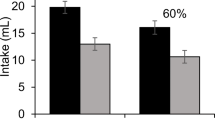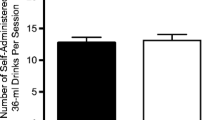Abstract
Rationale
Previous studies have shown that caffeine can reinforce flavour liking in overnight deprived moderate caffeine consumers (e.g. average of 250 mg/day) but not in low consumers (<120 mg/day). However, it is not possible to determine whether the difference between moderate and low caffeine consumers results from pre-existing individual differences in response to caffeine, or results directly from the different amounts of caffeine they habitually consume. If the former were true, then moderate consumers who are completely withdrawn should still manifest the flavour conditioning effect. Conversely, if the latter were true, consumers who are completely withdrawn should not manifest the effect.
Objectives
To examine whether moderate caffeine consumers who have been fully withdrawn from caffeine manifest the flavour conditioning effect.
Methods
In a double-blind study, 48 moderate caffeine consumers refrained from consuming caffeine for 4 weeks and were given replacement drinks to consume, which were either caffeinated (maintained group) or decaffeinated (withdrawn group). In the final 2 weeks, all subjects evaluated a novel drink containing either 100 mg caffeine or placebo on four non-consecutive days.
Results
The rated pleasantness of the novel drink containing caffeine increased over the four test days in the group maintained on caffeine, but pleasantness of the same drink fell significantly in the withdrawn group.
Conclusions
These data suggest that the ability of caffeine to reinforce changes in flavour liking are driven by the alleviation of withdrawal symptoms among habitual caffeine consumers and provide further support for the negative reinforcement theory.


Similar content being viewed by others
References
Bartoshuk LM (1991) Taste, smell and pleasure. In: Bolles RC (ed) The hedonics of taste. Lawrence Erlbaum, Hillside, pp 15–28
Brauer LH, Buican B, De Wit H (1994) Effects of caffeine deprivation on taste and mood. Behav Pharmacol 5:111–118
Bruce M, Scott N, Shrine P, Lader M (1991) Caffeine withdrawal: contrast of withdrawal symptoms in normal subjects who have abstained from caffeine. J Psychopharmacol 5:129–132
Evans SM, Griffiths RR (1992) Caffeine tolerance and choice in humans. Psychopharmacology 108:51–59
Evans SM, Critchfield TS, Griffiths RR (1994) Caffeine reinforcement demonstrated in a majority of moderate caffeine users. Behav Pharmacol 5:231–238
Fredholm BB (1984) Cardiovascular and renal actions of methylxanthines. In: Spiller GA (ed) The methylxanthine beverages and foods: chemistry, consumption, and health effects. Liss, New York, pp 303–330
Goldstein A, Kaizer S, Whitby O (1969) Psychotropic effects of caffeine in man. IV Quantitative and qualitative differences associated with habituation to coffee. Clin Pharmacol Ther 10:487–497
Griffiths RR, Woodson PP (1988) Reinforcing effects of caffeine in humans. J Pharmacol Exp Ther 246:21–29
Griffiths RR, Bigelow GE, Liebson IA (1986) Human coffee drinking: reinforcing and physical dependence producing effects. J Pharmacol Exp Ther 239:416–425
Griffiths RR, Evans SM, Heishman SJ, Preston KL, Sannerud CA, Wolf B, Woodson PP (1990) Low-dose caffeine physical dependence in humans. J Pharmacol Exp Ther 255:1123–1132
Hughes JR, Higgins ST, Bickel WK, Hunt WK, Fenwick JW, Gulliver SB, Mireault GC (1991) Caffeine self-administration, withdrawal, and adverse effects among coffee drinkers. Arch Gen Psychiatry 48:611–617
James JE (1991) Caffeine and health. Academic Press, London
James JE (1998) Acute and chronic effects of caffeine on performance, mood, headache and sleep. Neuropsychobiology 38:32–41
Lane JD (1997) Effects of brief caffeinated-beverage deprivation on mood, symptoms, and psychomotor performance. Pharmacol Biochem Behav 58:203–208
Richardson NJ, Rogers PJ, Elliman NA, O'Dell RJ (1995) Mood and performance effects of caffeine in relation to acute and chronic caffeine deprivation. Pharmacol Biochem Behav 52:313–320
Richardson NJ, Rogers PJ, Elliman NA (1996) Conditioned flavour preferences reinforced by caffeine consumed after lunch. Physiol Behav 60:257–263
Roache JD, Griffiths RR (1987) Interaction of diazepam and caffeine: behavioral and subjective dose effects in humans. Pharmacol Biochem Behav 26:801–812
Rogers PJ (2000) Why we drink caffeine-containing beverages, and the equivocal benefits of regular caffeine intake for mood and cognitive performance. In: Parliment TH, Ho CT, Schieberle P (eds) Caffeinated beverages: health benefits, physiological effects, and chemistry, ACS Symposium Series No. 754. American Chemical Society, Washington, pp 37–45
Rogers PJ, Richardson NJ, Elliman NA (1995) Overnight caffeine abstinence and negative reinforcement of preference for caffeine-containing drinks. Psychopharmacology 120:457–462
Schuh KJ, Griffiths RR (1997) Caffeine reinforcement: the role of withdrawal. Psychopharmacology 130:320–326
Silverman K, Evans SM, Strain EC, Griffiths RR (1992) Withdrawal syndrome after the double-blind cessation of caffeine consumption. N Engl J Med 327:1109–1114
Smit HJ, Rogers PJ (2000) Effects of low doses of caffeine on cognitive performance, mood and thirst in low and higher caffeine consumers. Psychopharmacology 152:167–173
van Dusseldorp M, Katan MB (1990) Headache caused by caffeine withdrawal among moderate coffee drinkers switched from ordinary to decaffeinated coffee: a 12-week double-blind trial. BMJ 300:1558–1559
Yeomans MR, Spetch H, Rogers PJ (1998) Conditioned flavour preference negatively reinforced by caffeine in human volunteers. Psychopharmacology 137:401–409
Yeomans MR, Jackson A, Lee MD, Nesic JS, Durlach PJ (2000a) Expression of flavour preferences conditioned by caffeine is dependent on caffeine deprivation state. Psychopharmacology 150:208–215
Yeomans MR, Jackson A, Lee MD, Steer B, Tinley EM, Durlach PJ, Rogers PJ (2000b) Acquisition and extinction of flavour preferences conditioned by caffeine in humans. Appetite 35:131–141
Yeomans MR, Ripley T, Lee MD, Durlach PJ (2001) No evidence for latent learning of liking for flavours conditioned by caffeine. Psychopharmacology 157:172–179
Zellner DA (1991) How foods get to be liked: some general mechanisms and some special cases. In: Bolles RC (ed) The hedonics of taste. Lawrence Erlbaum, Hillside, pp 199–217
Acknowledgements
This work was supported by a BBSRC studentship to Elizabeth Tinley with additional funding from Unilever plc.
Author information
Authors and Affiliations
Corresponding author
Rights and permissions
About this article
Cite this article
Tinley, E.M., Yeomans, M.R. & Durlach, P.J. Caffeine reinforces flavour preference in caffeine-dependent, but not long-term withdrawn, caffeine consumers. Psychopharmacology 166, 416–423 (2003). https://doi.org/10.1007/s00213-002-1354-1
Received:
Accepted:
Published:
Issue Date:
DOI: https://doi.org/10.1007/s00213-002-1354-1




